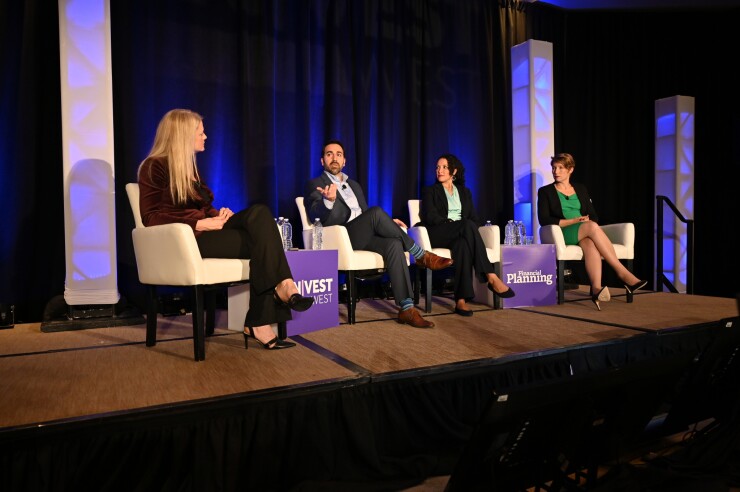SAN FRANCISCO — Wealth management and fintech companies should eliminate clauses in their employment contracts that require arbitration for sexual harassment claims, according to panel of advisors and financial industry professionals.
Forcing victims to go through arbitration “unequivocally is something that benefits the employer,” said Rachel Robasciotti, principal of Robasciotti & Philipson, who appeared on the panel, “How to Prevent Sexual Harassment in Fintech and Wealth Management” held at Financial Planning’s In|Vest West conference.

“[There is] probably nothing more important that we can do,” Robasciotti added. “Talk to your employment attorney to get it done.”
Arbitration clauses are the reason more women don’t speak openly about their experiences with sexual assault and harassment, Robasciotti said in a later interview. She urges industry employees to go to the website
Sexual harassers in companies “feel protected” by the arbitration clause, Alex Chalekian, CEO of Lake Avenue Financial, said during the panel discussion. Companies win arbitration cases around 80% of the time, he noted.
As Robasciotti put it: “A win for the harasser is a win for the firm.”
Chalekian, who
“Eliminating forced arbitration will open up the conversation we need to have,” he said in a later interview, adding that he has begun to change employment contracts at his own firm.
Another reason some sexual harassment is not stopped or divulged: reports of those incidents don’t appear in FINRA reports such as Broker Check, noted panelist Sonya Dreizler, a former financial services executive who is now a consultant with her own firm, Solutions With Sonya.
“If an incident is not investment related, it won’t show up in public records,” Dreizler. “It’s something that has to be addressed.”
The “cult of secrecy” surrounding sexual harassment is another major problem, according to the panelists. The advisory and fintech industries must create a safer environment for women to be able to speak out, the panelists said.
A culture of secrecy encourages “victim blaming” and prevents women from coming forward, according to Robasciotti. Women don’t share their stories because it’s “dangerous for their careers,” Dreizler added. And an industry culture that allowed women’s stories to be “swept under the rug” also serves as a deterrent, Chalekian said.

Industry executives also have to lead by example, Robasciotti said.
“Leaders have to have an inclusive vision,” she said. “When a leader says that you are a sex object, they are not acknowledging you as a person or as a professional.”
Advisory and fintech companies that don’t improve their record with women do so at their own peril, Chalekian warned. Women who are harassed at one firm after another will eventually leave the industry altogether, further diminishing the industry’s already depleted talent pool, he said, adding that firms that don’t treat their female customers with respect will also suffer the consequences.
Women are set to receive a disproportionate percentage of the wealth transfer as baby boomers die out, Chalekian noted. If firms continue to treat them as second class citizens, he said, “they will fire you guys.”





